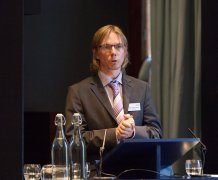Articles

Professor John Terry, at the recent award ceremony.
University of Exeter scientists receive Epilepsy Research UK research grant
University of Exeter scientists have received grant worth almost £150,000 to fund their crucial research, which could revolutionise epilepsy is diagnosed.
Professor John Terry and Dr Marc Goodfellow have received the substantial grant award from Epilepsy Research UK to fund pioneering research into improving diagnostics for the condition.
The project was one of nine nationwide to receive a grant from the charity at a special ceremony, held in London.
The 36-month project, entitled ‘An optimal computer model for the diagnosis and prognosis of focal epilepsies’, will develop a computational tool to support clinicians managing epilepsy through improved accuracy of diagnosis and suggesting personalised treatment plans for people with the condition.
Professor Terry said: “We are so grateful to the generous donations to Epilepsy Research UK that has made funding this project possible. This provides us with a very exciting opportunity to revolutionise the way in which we diagnose epilepsy.
“If successful, this will reduce the time people who we suspect as having epilepsy spend in clinic by 80% and improve the accuracy of diagnosis, providing reassurance to people with epilepsy.
“It will also facilitate personalised treatment plans, that we hope will enable more people to live seizure free and with fewer side-effects.”
Epilepsy research is underfunded in the UK so the grant awards made by Epilepsy Research UK significantly increase the pool of research being undertaken into this poorly understood condition.
Over the last five years ERUK has provided over a third of all research funding* into better understanding the condition: its diagnosis, treatment and possible cure.
Epilepsy Research UK’s Chief Executive Leigh Slocombe said: “I have seen first-hand the medical advances that have come from research that we have supported.
Research holds the key to so many unanswered questions about the condition. If we can fund more research we can make more breakthroughs and transform more lives."
Date: 22 May 2015
